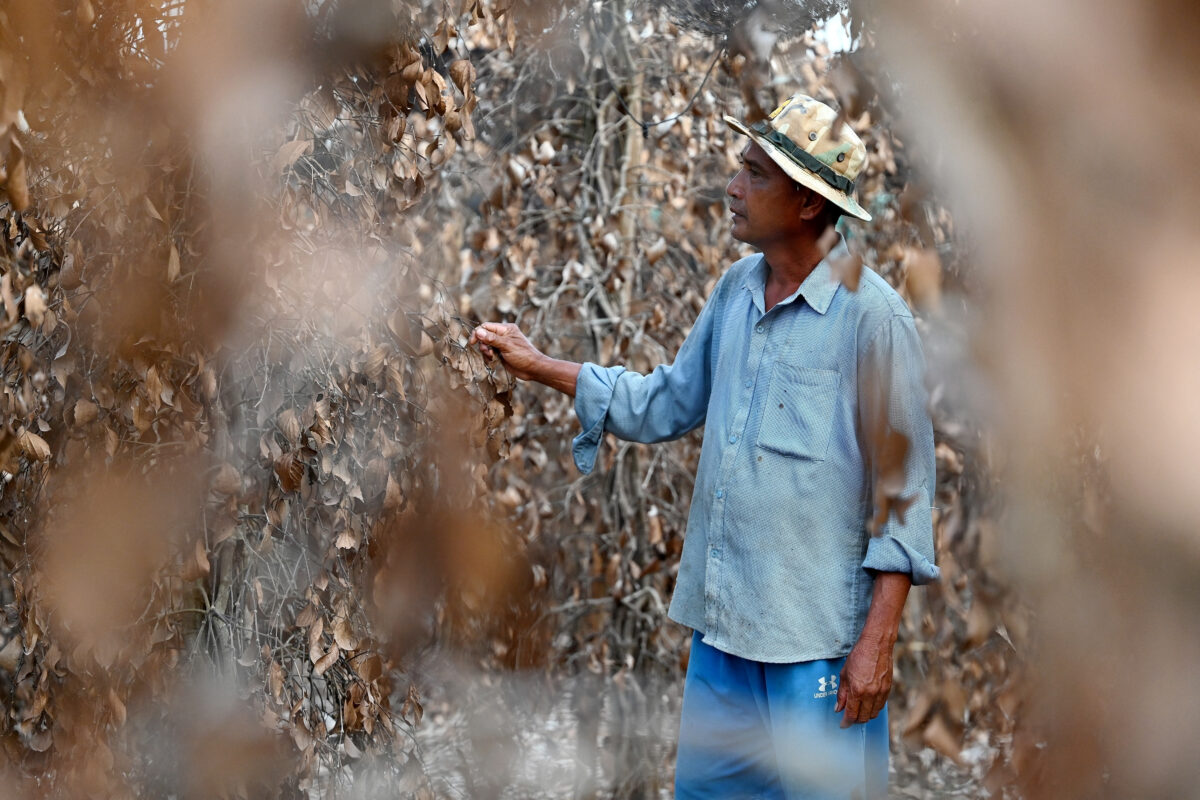Cambodia’s Kampot pepper can’t stand the heat

This photo taken on May 7, 2024 shows Cambodian farmer Chhim Laem looking at dead pepper plants at his farm in Kampot province. Famed for its intense floral flavor, Kampot pepper is prized by top chefs around the world and has survived decades of instability in Cambodia, but now faces the threat of extreme weather, driven by climate change. —Photo by Tang Chhin/Sothy/Agence France-Presse
KAMPOT, Cambodia — Farmer Chhim Laem shakes his head as he walks between long rows of dead bushes, their brown leaves scorched by heat and drought that have devastated Cambodia’s famed Kampot pepper crop.
Known for its intense floral flavor, Kampot pepper is prized by top chefs around the world and sells for up to $200 (P11,570) per kilo.
Nurtured for generations in two provinces in southwest Cambodia, the pepper industry survived the genocidal Khmer Rouge and decades of instability, but now faces the threat of extreme weather driven by climate change.
“It is so hot this year, no rains, and we have no water to water the pepper plants,” Laem told Agence France-Presse (AFP). “So they all died.”
READ: Drought damage P4.3B; UN airs call to aid PH
Article continues after this advertisementSouth and Southeast Asia have sweltered in recent weeks under record temperatures, with governments closing schools, people dying of heatstroke and farmers praying for rain.
Article continues after this advertisementScientists warn that human-induced climate change will produce more frequent, longer and more intense heat waves.
In parts of Cambodia, the mercury nearly hit 43 degrees Celsius in late April — after a six-month drought that pushed farmers to a breaking point.
All 264 of Laem’s pepper bushes perished, the 55-year-old explained, due to water shortages and hot weather.
Production has grown in recent years, boosted by the European Union granting the spice a “protected geographical indication” in 2016 — meaning that only pepper grown in a designated area can be called Kampot.
The Kampot region produced about 120 tons of peppercorns last year, but farmers say that excessive heat and rain have made 2024 the worst on record.
Laem earned about $1,000 from his farm last year, but said he expects a fraction of that now.
‘The worst year’
Nguon Lay is a fourth-generation pepper farmer, harvesting nine tons from his nearby five-hectare farm last year.
But the 71-year-old farmer expected to harvest nothing this year.
Torrential rain destroyed the plants’ flowers earlier in the season, with more dying in the prolonged drought that followed. “So it is the worst year. We don’t know what to do. We see problems, but we can’t resolve them,” Lay said.
Like other farmers, Lay said he knew the problems came from the weather and the environment.
Several ponds used to water his plants have dried up, and his workers only water the crop once every five days.
“We have been prepared. We know about climate change, we have stored water, we built roofs to protect our peppers from the hot weather, but it was not enough.”
Kampot pepper gained global acclaim during the French colonial occupation of Cambodia when it was exported widely, but the industry was nearly wiped out during the Khmer Rouge era.
In more recent years it has bounced back, gracing hip restaurant menus across the globe.
Kann Sinouch, president of the Kampot Pepper Promotion Association, said he expected this year’s pepper yield to be halved — and warned of an export shortage in 2025. —Agence France-Presse